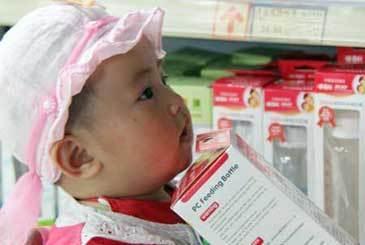
A baby holds a feeding bottle on Tuesday in a supermarket in Linfen, Shandong province. [Xinhua]
Chinese authorities have banned the use of Bisphenol A (BPA) in making baby bottles as they continue their pitched battle to improve food safety. This decision puts China alongside many countries in the world that have also banned the chemical compound.
In a notice published Monday on its website, China's Ministry of Health (MOH), along with five other departments, announced that starting today, the production of nursing bottles containing BPA will be prohibited, and that their sale and import will be banned from September 1.
The authorities "decided to remove the chemical from baby feeders to reduce food safety risks and to protecting infants' health," it said.
The notice also tells local food security inspectors to be aware of any potential violations of the ban, the Xinhua News Agency reported.
BPA is a monomer used to make polycarbonate plastic and other materials. It is widely used around the world for making baby feeders, water jugs and plastic dishware, as it makes them bright and durable.
"Prior to widespread reports about its hazards earlier this year, baby feeders containing BPA accounted for more than 80 percent of the annual 1.6 billion yuan ($246.96 million) domestic market," Dong Jinshi, a Beijing-based food-safety expert and secretary-general of the International Food Packaging Association, told the Global Times.
The ban is the latest in a series of measures to improve food safety in China.
"It does make me feel safer for my baby. But who knows if any BPA-containing feeders will be found in shops again in the future?" Ding Li, 33, a pregnant woman in Beijing, told the Global Times. "Recent food safety scandals have forced us to always prepare for the worst."
Dong noted that authorities must still set thresholds for all chemicals used in food production, and should increase scientific tests as part of current regulations.
"The improvement of examination standards and procedures and the punishment of lawbreakers are vital for a safe food market," he said.
The Supreme People's Court, in a recent notice, said courts should hand down the death sentence to those found guilty of food safety violations that result in human death, Xinhua reported.
The notice ordered courts to impose larger fines on people guilty of food safety violations.
On the other hand, the ban could put some shop owners in a dilemma on how to offload their remaining products before the deadline falls in three months.
An infant commodities seller surnamed Liu in Pingxiang, Jiangxi Province, said he was surprised by the ban after the sale of BPA-containing bottles improved a little recently after consumer confidence was shattered by the EU's ban in March.
"I'm afraid all the plastic feeders in my store will become worthless, since parents will not trust the bottles anymore. The ban will make them feel the plastics are not safe," Liu added.
China began research and assessment of the potential safety hazards of BPA several years ago. Science China magazine published a report in late 2009 saying that researchers had found BPA accelerates the production of estrogen in mice.
A study by the US Food and Drug Administration (FDA) in January 2010 acknowledged the potential effects of BPA on the brain, behavior, and prostate gland in fetuses, infants, and young children.
The FDA said that although standardized toxicity tests have thus far supported the safety of current low levels of human exposure to BPA, more research was needed and measures should be taken to reduce exposure.
In 2008, Canada became the first country to ban BPA in all food packaging and containers.
The European Commission announced in March that it would prohibit the manufacture and sale of BPA-containing feeding bottles in all its 27 member states starting today, three months after production was outlawed.
In the US, nine states, including Washington and California, have banned the chemical.
However, despite these safety measures, many scientists still argue that there exists no solid evidence linking the current level of exposure to BPA to negative impacts on human health, although there have been tests showing the chemical has negative effects on animals.
Vic Gilliam, a Republican representative from Silverton, Oregon and co-chairman of the state's House Energy, Environment and Water Committee, told local newspaper The Register-Guard that the main factor that made him a "no" vote on the legislation to ban BPA in Oregon is that the industry is already moving toward taking the chemical out of its products because of growing consumer distrust.





